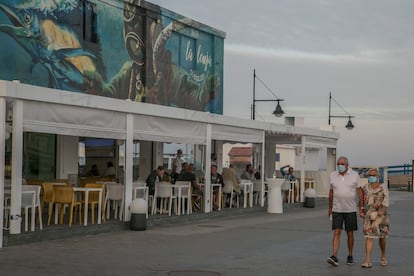Spanish regions announce new coronavirus measures for Christmas season
Valencia to keep borders sealed until January 15, while the Canary Islands will let visitors enter with an antigen test instead of a PCR

Several regions of Spain on Wednesday announced new coronavirus measures ahead of the Christmas holidays.
The government of the Balearic Islands said that the curfew is being pushed forward to 10pm due to a surge in infections. The 14-day cumulative number of cases per 100,000 inhabitants in the Mediterranean archipelago is 260, up from 223 a week ago.
Andalusian officials announced that existing restrictions on mobility and social gatherings will remain in place until December 12, at which time a new announcement will be made regarding new measures “to keep the situation under control during Christmas.”
In the Valencia region, authorities said that the borders will remain sealed until January 15. Travel will be only permitted on December 23, 24, 25, 31 and on January 1 for visits to relatives and close friends, known as allegados.
The Canary Islands said that they will allow foreign tourists to travel to the islands with an antigen test, instead of the PCR test that the central government recently made into a requirement for coming to Spain. The regional decree goes into effect on Thursday despite the fact that it contradicts central government regulations on international travel to the country. The Canary Islands have been posting a much lower incidence rate that the mainland, and the tourism sector is keen to save the high season, which begins now.
The Canary Islands will also impose a curfew from 1am to 6am between December 23 and January 10. The curfew will be pushed back to 1.30am on Christmas Eve and New Year’s Eve. The archipelago was the only region in Spain to be exempt from the measure, which was introduced under the state of alarm on October 26.
Politicizing the pandemic
Fernando Simón, the head of Spain’s Health Alert and Emergency Coordination Center (CCAES) and a familiar face to Spaniards through his daily news conferences, has written a letter in the science journal The Lancet defending Spain’s management of the pandemic and criticizing its political manipulation.
“Politicization and an unfortunate climate of confrontation permeating different sectors makes effective crisis communication challenging and is likely to impair response efforts,” said the letter, co-written with four other public health professionals. In August, The Lancet published two open letters written by Spanish researchers asking for an independent assessment of the coronavirus response, and in October it ran an editorial titled “COVID-19 in Spain: a predictable storm?” that wondered if the current situation in the country could have been avoided.
Meanwhile, the central government on Wednesday announced that coronavirus vaccines and tests will be exempt from value added tax (VAT), following European Union guidelines issued on Monday. Government spokesperson María Jesús Montero said the immunizations will be available free of charge through the public healthcare system, and will not go on sale through commercial distribution channels.
English version by Susana Urra.
Tu suscripción se está usando en otro dispositivo
¿Quieres añadir otro usuario a tu suscripción?
Si continúas leyendo en este dispositivo, no se podrá leer en el otro.
FlechaTu suscripción se está usando en otro dispositivo y solo puedes acceder a EL PAÍS desde un dispositivo a la vez.
Si quieres compartir tu cuenta, cambia tu suscripción a la modalidad Premium, así podrás añadir otro usuario. Cada uno accederá con su propia cuenta de email, lo que os permitirá personalizar vuestra experiencia en EL PAÍS.
¿Tienes una suscripción de empresa? Accede aquí para contratar más cuentas.
En el caso de no saber quién está usando tu cuenta, te recomendamos cambiar tu contraseña aquí.
Si decides continuar compartiendo tu cuenta, este mensaje se mostrará en tu dispositivo y en el de la otra persona que está usando tu cuenta de forma indefinida, afectando a tu experiencia de lectura. Puedes consultar aquí los términos y condiciones de la suscripción digital.









































